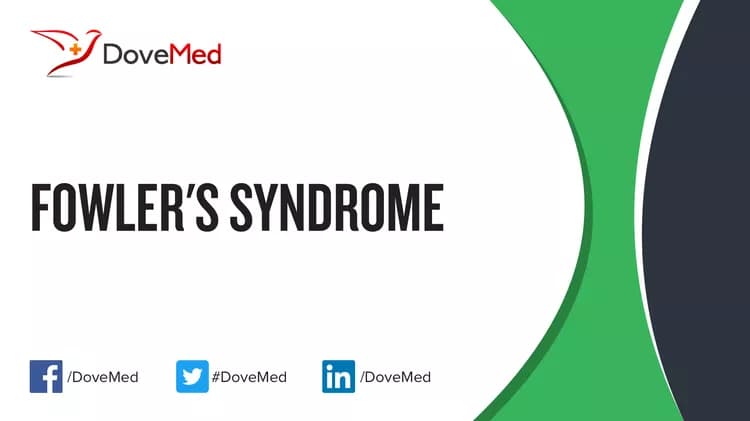What are the other Names for this Condition? (Also known as/Synonyms)
- Fowler Christmas Chapple Syndrome
- Polycystic Ovaries Urethral Sphincter Dysfunction
- Voiding Dysfunction and Polycystic Ovaries
What is Fowler's Syndrome? (Definition/Background Information)
- Fowler’s Syndrome is characterized by urinary retention associated with abnormal electromyographic activity in young women in the absence of overt neurologic disease
- Some women with this syndrome have polycystic ovaries as well
(Source: Fowler's Syndrome; Genetic and Rare Diseases Information Center (GARD) of National Center for Advancing Translational Sciences (NCATS), USA.)
Who gets Fowler's Syndrome? (Age and Sex Distribution)
- Fowler's Syndrome is a rare disorder affecting young women
- Worldwide, individuals of all racial and ethnic groups may be affected
What are the Risk Factors for Fowler's Syndrome? (Predisposing Factors)
The risk factors for Fowler's Syndrome are:
- Female gender
- Women in their 20s and 30s are the most affected
It is important to note that having a risk factor does not mean that one will get the condition. A risk factor increases one’s chances of getting a condition compared to an individual without the risk factors. Some risk factors are more important than others.
Also, not having a risk factor does not mean that an individual will not get the condition. It is always important to discuss the effect of risk factors with your healthcare provider.
What are the Causes of Fowler's Syndrome? (Etiology)
The cause of Fowler's Syndrome is not known.
- The association of Fowler’s Syndrome and polycystic ovaries in some patients raises the possibility that the syndrome is linked in some way to impaired muscle membrane stability, owing possibly to a hormonal abnormality
- The involvement of such a hormonal abnormality may also explain why it primarily affects premenopausal women
(Source: Fowler's Syndrome; Genetic and Rare Diseases Information Center (GARD) of National Center for Advancing Translational Sciences (NCATS), USA.)
What are the Signs and Symptoms of Fowler's Syndrome?
The signs and symptoms of Fowler's Syndrome may include:
- Abnormality of the urethra
- Acne
- Amenorrhea
- Dysuria
- EMG abnormality
- Hirsutism
- Oligomenorrhea
- Polycystic ovaries
- Urinary retention
- Urinary incontinence
(Source: Fowler's Syndrome; Genetic and Rare Diseases Information Center (GARD) of National Center for Advancing Translational Sciences (NCATS), USA.)
How is Fowler's Syndrome Diagnosed?
- Diagnosis of Fowler’s Syndrome involves ruling out neurological or laboratory features that would support a diagnosis of a underlying neurological disease, and identification of a bladder capacity of over 1 liter with no sensation of urgency
- Also in Fowler’s Syndrome, analysis of the striated muscle of the urethral sphincter using concentric needle electrode examination reveals a fairly unique electromyographic (EMG) abnormality
- This EMG abnormality is found in association with the urethral sphincter (group of muscles which surround the urinary passage below the bladder), and consists of a type of activity that would be expected to cause inappropriate contraction of the muscle (i.e., impair sphincter relaxation)
(Source: Fowler's Syndrome; Genetic and Rare Diseases Information Center (GARD) of National Center for Advancing Translational Sciences (NCATS), USA.)
Many clinical conditions may have similar signs and symptoms. Your healthcare provider may perform additional tests to rule out other clinical conditions to arrive at a definitive diagnosis.
What are the possible Complications of Fowler's Syndrome?
The complications of Fowler's Syndrome may include:
- Recurrent urinary tract infections due to urine retention
- Severe pelvic pain
- Risk of miscarriage in pregnant women
Complications may occur with or without treatment, and in some cases, due to treatment also.
How is Fowler's Syndrome Treated?
- The urinary incontinence caused by Fowler’s Syndrome may be treated by sacral neuromodulation therapy. The success rate for treatment of Fowler’s Syndrome with neuromodulation has been estimated to be around 70%, even in women who have been experiencing symptoms for a while:
- Neuromodulation therapy involves the stimulation of nerves to the bladder leaving the spine
- The FDA has approved a device called InterStim for this purpose. The doctor applies an external stimulator to determine if neuromodulation works in you. If you have a 50 percent reduction in symptoms, a surgeon will implant the device
- Although neuromodulation can be effective, it is not for everyone. The therapy is expensive, involving surgery with possible surgical revisions and replacement
- Other treatments that have been tried with little success include hormonal manipulation, pharmacologic therapy, and injections of botulinum toxin
(Source: Fowler's Syndrome; Genetic and Rare Diseases Information Center (GARD) of National Center for Advancing Translational Sciences (NCATS), USA.)
How can Fowler's Syndrome be Prevented?
- Currently, Fowler's Syndrome may not be preventable, since the exact cause of this condition is not known
- Active research is currently being performed to explore the possibilities for treatment and prevention of disorders such as Fowler’s Syndrome
- Regular medical screening at periodic intervals with tests and physical examinations are recommended
What is the Prognosis of Fowler's Syndrome? (Outcomes/Resolutions)
- The prognosis of Fowler's Syndrome is dependent upon the severity of the signs and symptoms and associated complications, if any
- Individuals with mild conditions have better prognosis than those with severe symptoms and complications
- Typically, the prognosis may be assessed on a case-by-case basis
Additional and Relevant Useful Information for Fowler's Syndrome:
The following DoveMed website link is a useful resource for additional information:
Related Articles
Test Your Knowledge
Asked by users
Related Centers
Related Specialties
Related Physicians
Related Procedures
Related Resources
Join DoveHubs
and connect with fellow professionals


0 Comments
Please log in to post a comment.